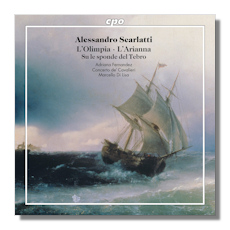
The Internet's Premier Classical Music Source
Related Links
- A. Scarlatti Reviews
- Latest Reviews
- More Reviews
-
By Composer
-
Collections
DVD & Blu-ray
Books
Concert Reviews
Articles/Interviews
Software
Audio
Search Amazon
Recommended Links
Site News
 CD Review
CD Review
Alessandro Scarlatti

Secular Cantatas
- L'Olimpia
- L'Arianna
- Su Le sponde del Tebro
Adriana Fernández, soprano
Concerto de' Cavalieri/Marcello Di Lisa
CPO 777748-2
The (vocal) music of Alessandro Scarlatti (1660-1725) is undergoing something of a revival at the moment. Father of Domenico (whose keyboard work is easier to categorize), for many Alessandro is still less well known, and even where he is. it's only as the founder of the Neapolitan school of opera. His non operatic choral and vocal work also delights, though, and is full of variety and subtlety. Yet Scarlatti's priorities are at times remarkably forward-thinking. His style represents much more than an arid link between the florid Italian Baroque and classical eighteenth century, which was to lead to the insights of Haydn and Mozart. The poignancy of "Infelici miei lumi" (Su le sponde) [tr.22], for instance, is almost romantic in its slow, sighing pacing, fetching chromaticism, and dolorous textures.
Indeed, this enjoyable CD from cpo illustrates the ways in which Scarlatti pressed musical and instrumental resources to serve the interests of his acute psychological observation. The disk contains three secular cantatas – L'Olimpia and L'Arianna for soprano, strings and basso continuo, and Su Le sponde del Tebro for soprano, trumpet, strings and basso continuo. Marcello Di Lisa and the Concerto de' Cavalieri have a couple of other CDs of Scarlatti's work to their credit, as well as one of Pergolesi. Argentinean soprano, Adriana Fernández a handful more.
It's inevitably on Fernández' shoulders that much weight and responsibility falls: Scarlatti's writing leaves no room for error… the light that illuminates every angle and corner of the soloist's articulation is bright and unmerciful. This is hardly surprising give the common theme of these three wonderful works: the abandoned lover and her despair. Typical is the very first aria of L'Olimpia, "Aiutatemi a morire" [tr.3] ("Help me to die")! It's unhurried, plangent and exposed. Yet neither histrionic nor uncontrolled. But the writing really emphasizes one range of emotions.
That's as it should be: Ariadne is the figure of Greek myth, Olimpia comes from Ariosto's "Orlando Furioso" and Aminta (the "heroine" of Su le sponde) all appear numerous times in the Baroque pastoral. These are venerable dramatic vehicles for equally venerable dramatic topoi. They require depth and perception; not stock phrasing and musical gestures. They receive these from Fernández nicely. The cantatas have in places complex structures and need a sympathetic interpretation in order for their subtleties, contrasts and nuances to emerge fully.
Although Fernández' approach has all those qualities, as well as a gentle, almost reserved and calm delivery (borne of inhabiting the desperate, maybe), although her grasp of the dramatic idiom is good, although her inhabiting of the role appropriate and convincing, there is a hint more than once (in all three cantatas) of a slight unsteadiness in her voice, a minute waywardness. This has nothing to do with bravura or any sense of her own importance (something which contemporary singers may surely have allowed themselves), but almost a limitation in her technique, a thinness. Leading and opening notes in certain bars, for example, lack the accuracy and hold that would have made Fernández' a top flight performance.
The instrumental playing of Concerto De' Cavalieri with Gabriele Cassone (trumpet) in Su le sponde, actually the shortest of the three cantatas… they last around 15 to 20 minutes each, is superb. Pointed, expressive, displaying just the right amount of anticipation of the rhetorical moments without ever either "spiking" them, nor affording them undue accent, the ensemble's nine players with Di Lisa himself playing harpsichord, don't miss a beat. Their sound is also rounded, full, rich; it makes the most of Scarlatti's intriguing use of theorbo, guitar and harp as well as strings.
The acoustic is clean and relatively close. Fernández' voice is never obscured by the instrumental presence, which too is well-focused sonically. Not to have attempted spurious projection of the dramatic impact of the music as a recording when the notes say it all was a wise decision. At under 50 minutes, the CD is a little on the short side, it has to be said. The booklet is up to cpo's usual high standards with all the background you need and full texts in Italian, English and German. The music on this CD is more than a trio of curiosities. It's full of substance and – reservations about Fernández' strengths aside – is worth a listen.
Copyright © 2012, Mark Sealey.





















